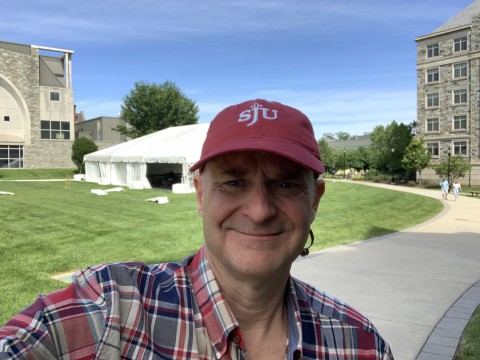
The weather that Sunday was beautiful and I was excited to go to the KROC Center in Camden, NJ for my weekly swim. I said goodbye to my son and headed off to the pool. A long-distance swimmer at the time, my typical routine was to swim for about an hour, covering two and a half kilometers. Given my age of 53, I felt good about my physical health and stamina.
As I pushed through the first couple laps watching the bubbles rise around my swim goggles, I decided for reasons, which to this day baffle me, to get out of the pool. I swam to the edge and considered whether to drop down eight feet and kick off the bottom or simply hoist myself out onto the deck. Fortunately, I chose the latter, and struggled onto my feet. When I turned toward the starting block, everything went black. Unknown to me at the time, I had collapsed in sudden cardiac arrest (SCA), hitting the starting block as I dropped to the ground. Fortunately, I was 20 feet away from Officer C. J. Reyes, a police officer in my community, who immediately began resuscitation efforts. I would learn weeks later that after receiving chest compressions and a single shock from the AED, my heart began beating again. EMS arrived shortly later, put my body on ice, and transported me to Cooper Medical Center where I was placed in the skillful hands of their cardiac team.
As I regained consciousness the following day, 20 hours after my cardiac arrest, I woke up intubated and wondered. Where had the pool gone? Why were my friends and family coming out of the blue to visit me? Didn't they know I had just gone for my routine swim? Soon after, I started to think about my dad, Robert, who at 52 suffered a fatal cardiac arrest 30-years prior. It was his “first” and, as is all too common, his “last.” I considered how cardiac arrest had ended his life in a moment and how it left in its wake a devastated wife and six children. That day, I learned I had multi-vessel heart disease. I would need immediate cardiac bypass surgery. This came as a shock given that I had experienced no prior symptoms. As a distance swimmer, I believed I was in great cardiac shape and that my diet wasn’t “that” bad. I struggled to get my head around facing death in such an immediate and visceral way.
In the weeks to follow, I discovered that anyone can go into sudden cardiac arrest regardless of age or even health. I know that I’m alive for one simple reason. I was standing 20 feet from Officer Reyes, who knew how to work an AED and was confident in his ability to apply CPR. While no one walks away from a sudden cardiac arrest unscathed, because of him, I was able to walk away alive, and a lucky man.
There are a few final thoughts I’d like to share. I know in the depths of my heart (pun intended), that SCA hits you like a freight train. While it often takes its victim away from everyone and everything they hold most dear, that doesn't need to be the case. There are things that can be done: eating nutritious food – avoiding the junk, staying active, doing the things you love, building mental tools to handle life’s most difficult curveballs, and perhaps most of all, getting the message out that cardiac problems are nothing to joke about. AEDs and CPR saves lives!
So this is my story. Cardiac arrest attempted to stop my life in its tracks, just like my dad. But my story didn't end there, cardiac arrest failed this time around. In some miraculous twist of fate initiated by Officer Reyes, I managed to walk away. That needs to happen more often and in more communities. I know he played the lead role in saving my life, but I am grateful to the supporting cast as well. Afterall, people like him don't exist without people who stand behind them; teaching them and preparing them. I can’t help but think about the people who supported me: my family, friends and coworkers; the professionals in the hospital and the researchers upon whose shoulders they stand. Finally, I can't help but appreciate my fellow SCA and cardiac survivors, people who have been willing to share the most perilous experience of their life to help others heal.
So, over the past few years, I have continued to heal in mind and body. Last summer, I was back at the same pool pushing out 500 meters. I even crawled back into Lane #3, the place where my cardiac story began. While the physical and mental challenges will no doubt continue, I learned that our worst experiences can hold the key to the most amazing lessons. This experience taught me the most profound lesson of all: these lives of ours dangle from a thread; and as we dangle we are upheld and uplifted by others.
By Joseph Fisher
